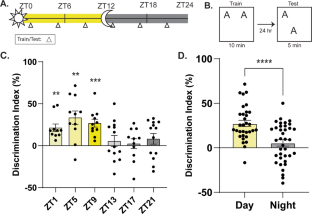2023-07-20 ペンシルベニア州立大学(PennState)
◆研究結果は、記憶と体内時計の関連性を示し、記憶形成の分子メカニズムを理解する手掛かりとなるものです。この知見により、人々が最適なタイミングで学習する方法を理解する上で役立つ可能性があります。
<関連情報>
- https://www.psu.edu/news/eberly-college-science/story/circadian-clock-gene-helps-mice-form-memories-better-during-day/
- https://www.nature.com/articles/s41386-023-01616-1
時計遺伝子Per1が海馬の記憶統合を日中制御している可能性 The clock gene Per1 may exert diurnal control over hippocampal memory consolidation
Lauren Bellfy,Chad W. Smies,Alicia R. Bernhardt,Kasuni K. Bodinayake,Aswathy Sebastian,Emily M. Stuart,Destiny S. Wright,Chen-Yu Lo,Shoko Murakami,Hannah M. Boyd,Megan J. von Abo,Istvan Albert & Janine L. Kwapis
Neuropsychopharmacology Published:01 June 2023
DOI:https://doi.org/10.1038/s41386-023-01616-1

Abstract
The circadian system influences many different biological processes, including memory performance. While the suprachiasmatic nucleus (SCN) functions as the brain’s central pacemaker, downstream “satellite clocks” may also regulate local functions based on the time of day. Within the dorsal hippocampus (DH), for example, local molecular oscillations may contribute to time-of-day effects on memory. Here, we used the hippocampus-dependent Object Location Memory task to determine how memory is regulated across the day/night cycle in mice. First, we systematically determined which phase of memory (acquisition, consolidation, or retrieval) is modulated across the 24 h day. We found that mice show better long-term memory performance during the day than at night, an effect that was specifically attributed to diurnal changes in memory consolidation, as neither memory acquisition nor memory retrieval fluctuated across the day/night cycle. Using RNA-sequencing we identified the circadian clock gene Period1 (Per1) as a key mechanism capable of supporting this diurnal fluctuation in memory consolidation, as learning-induced Per1 oscillates in tandem with memory performance in the hippocampus. We then show that local knockdown of Per1 within the DH impairs spatial memory without affecting either the circadian rhythm or sleep behavior. Thus, Per1 may independently function within the DH to regulate memory in addition to its known role in regulating the circadian system within the SCN. Per1 may therefore exert local diurnal control over memory consolidation within the DH.

